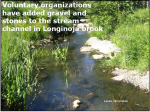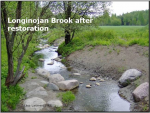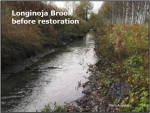Case study:Restoration of Longinoja brook: Difference between revisions
No edit summary |
No edit summary |
||
| Line 16: | Line 16: | ||
|Project picture=Longinoja after restauration may 2006(photo. Liisa Laitinen).jpg | |Project picture=Longinoja after restauration may 2006(photo. Liisa Laitinen).jpg | ||
|Picture description=Longinoja after restauration_may 2006 (photo: Liisa Laitinen) | |Picture description=Longinoja after restauration_may 2006 (photo: Liisa Laitinen) | ||
|Project summary=Longinoja brook has been restored several times during | |Project summary=Longinoja brook has been restored several times during years 2006-2011. The straightened brook flows through densely populated area and partly along cultivated area. The brook is situated in the city of Helsinki. Longinoja brook is an important breeding area for the sea trout of the Vantaanjoki River. The aims of restorations was to create and increase the breeding possibilities for migrating fish and also to improve the area’s landscape. Restoration was part of the project where modern environmental hydraulic engineering methods were studied in the areas with fine-grained soils. The planning aimed to enhance natural conditions and at the same time maintain sufficient drainage level. The restoration project has been a good example of a succeeded co-operation between different organizations and stakeholders. The project was managed by the Finnish Environmental authorities (Finnish Environment Institute and The Centre for Economic Development, Transport and the Environment) and the city of Helsinki. The restoration work was mostly accomplished by volunteers in co-operation with the authorities. | ||
}} | }} | ||
{{Case_study_subcatchment | {{Case_study_subcatchment | ||
Revision as of 13:20, 21 February 2013
Project overview
| Status | Complete |
|---|---|
| Project web site | http://www.ymparisto.fi/default.asp?node=27550&lan=fi |
| Themes | Fisheries, Habitat and biodiversity, Hydromorphology, Social benefits |
| Country | Finland |
| Main contact forename | Harri |
| Main contact surname | Aulaskari |
| Main contact user ID | |
| Contact organisation | Centre for Economic Development, Transport and the Environment for Uusimaa, Finnish Environment Institute |
| Contact organisation web site | |
| Partner organisations | |
| This is a parent project encompassing the following projects |
Project summary
Longinoja brook has been restored several times during years 2006-2011. The straightened brook flows through densely populated area and partly along cultivated area. The brook is situated in the city of Helsinki. Longinoja brook is an important breeding area for the sea trout of the Vantaanjoki River. The aims of restorations was to create and increase the breeding possibilities for migrating fish and also to improve the area’s landscape. Restoration was part of the project where modern environmental hydraulic engineering methods were studied in the areas with fine-grained soils. The planning aimed to enhance natural conditions and at the same time maintain sufficient drainage level. The restoration project has been a good example of a succeeded co-operation between different organizations and stakeholders. The project was managed by the Finnish Environmental authorities (Finnish Environment Institute and The Centre for Economic Development, Transport and the Environment) and the city of Helsinki. The restoration work was mostly accomplished by volunteers in co-operation with the authorities.
Monitoring surveys and results
Lessons learnt
Catchment and subcatchment
Edit the catchment and subcatchment details
(affects all case studies in this subcatchment)
Catchment
| River basin district | Southern Finland |
|---|---|
| River basin | Vantaanjoki River |
Subcatchment
| River name | Longinoja brook |
|---|---|
| Area category | 10 - 100 km² |
| Area (km2) | 12 km²1,200 ha <br /> |
| Maximum altitude category | |
| Maximum altitude (m) | |
| Dominant geology | |
| Ecoregion | Fenno-Scandian Shield |
| Dominant land cover | Urban |
| Waterbody ID |
Site
| Name | Cathment of Longinoja brook |
|---|---|
| WFD water body codes | |
| WFD (national) typology | |
| WFD water body name | |
| Pre-project morphology | Straight |
| Reference morphology | Sinuous |
| Desired post project morphology | |
| Heavily modified water body | true |
| National/international site designation | |
| Local/regional site designations | multiple designations across the site |
| Protected species present | |
| Invasive species present | |
| Species of interest | |
| Dominant hydrology | Ephemeral |
| Dominant substrate | |
| River corridor land use | Urban |
| Average bankfull channel width category | |
| Average bankfull channel width (m) | |
| Average bankfull channel depth category | |
| Average bankfull channel depth (m) | |
| Mean discharge category | |
| Mean annual discharge (m3/s) | |
| Average channel gradient category | |
| Average channel gradient | |
| Average unit stream power (W/m2) |
Project background
| Reach length directly affected (m) | |
|---|---|
| Project started | 2006/01/01 |
| Works started | |
| Works completed | 2011/01/01 |
| Project completed | |
| Total cost category | 10 - 50 k€ |
| Total cost (k€) | 10000 k€10,000,000 € <br /> |
| Benefit to cost ratio | |
| Funding sources | Finnish Environment Institute |
Cost for project phases
| Phase | cost category | cost exact (k€) | Lead organisation | Contact forename | Contact surname |
|---|---|---|---|---|---|
| Investigation and design | |||||
| Stakeholder engagement and communication | |||||
| Works and works supervision | |||||
| Post-project management and maintenance | |||||
| Monitoring | Finnish Environment Institute |
Reasons for river restoration
Measures
Structural measures
| |
|---|---|
| Bank/bed modifications | Building fishways, Building of submerged weirs and pits, Adding sinuosity, Introducing gravel |
| Floodplain / River corridor | |
| Planform / Channel pattern | Introducing sinuosity, Introducting large woody debris |
| Other | |
Non-structural measures
| |
| Management interventions | |
| Social measures (incl. engagement) | |
| Other | Information provision, Participation in works, Participation in monitoring |
Monitoring
Hydromorphological quality elements
| Element | When monitored | Type of monitoring | Control site used | Result | ||
|---|---|---|---|---|---|---|
| Before measures | After measures | Qualitative | Quantitative | |||
| Continuity for organisms | Awaiting results | |||||
| Continuity of sediment transport | Awaiting results | |||||
Biological quality elements
| Element | When monitored | Type of monitoring | Control site used | Result | ||
|---|---|---|---|---|---|---|
| Before measures | After measures | Qualitative | Quantitative | |||
| Fish: Abundance | Awaiting results | |||||
| Fish: Disturbance-sensitive species | Awaiting results | |||||
| Fish: Age structure | Awaiting results | |||||
| Invertebrates: Abundance | Awaiting results | |||||
Physico-chemical quality elements
| Element | When monitored | Type of monitoring | Control site used | Result | ||
|---|---|---|---|---|---|---|
| Before measures | After measures | Qualitative | Quantitative | |||
| [[]] | ||||||
Any other monitoring, e.g. social, economic
| Element | When monitored | Type of monitoring | Control site used | Result | ||
|---|---|---|---|---|---|---|
| Before measures | After measures | Qualitative | Quantitative | |||
| Landscape enchansement | Yes | Awaiting results | ||||
Monitoring documents
Image gallery
Additional documents and videos
Additional links and references
| Link | Description |
|---|---|
| http://www.ecrr.org/publication/ecrrbrochure.pdf | ACRR Addressing practitioners, The Longinoja and Matapuro Brook Projects |
| http://www.itamerihaaste.net/files/327/Pellikka City of Helsinki.pdf | Katja Pellikka, Urban brook reflects the catchment area. |








